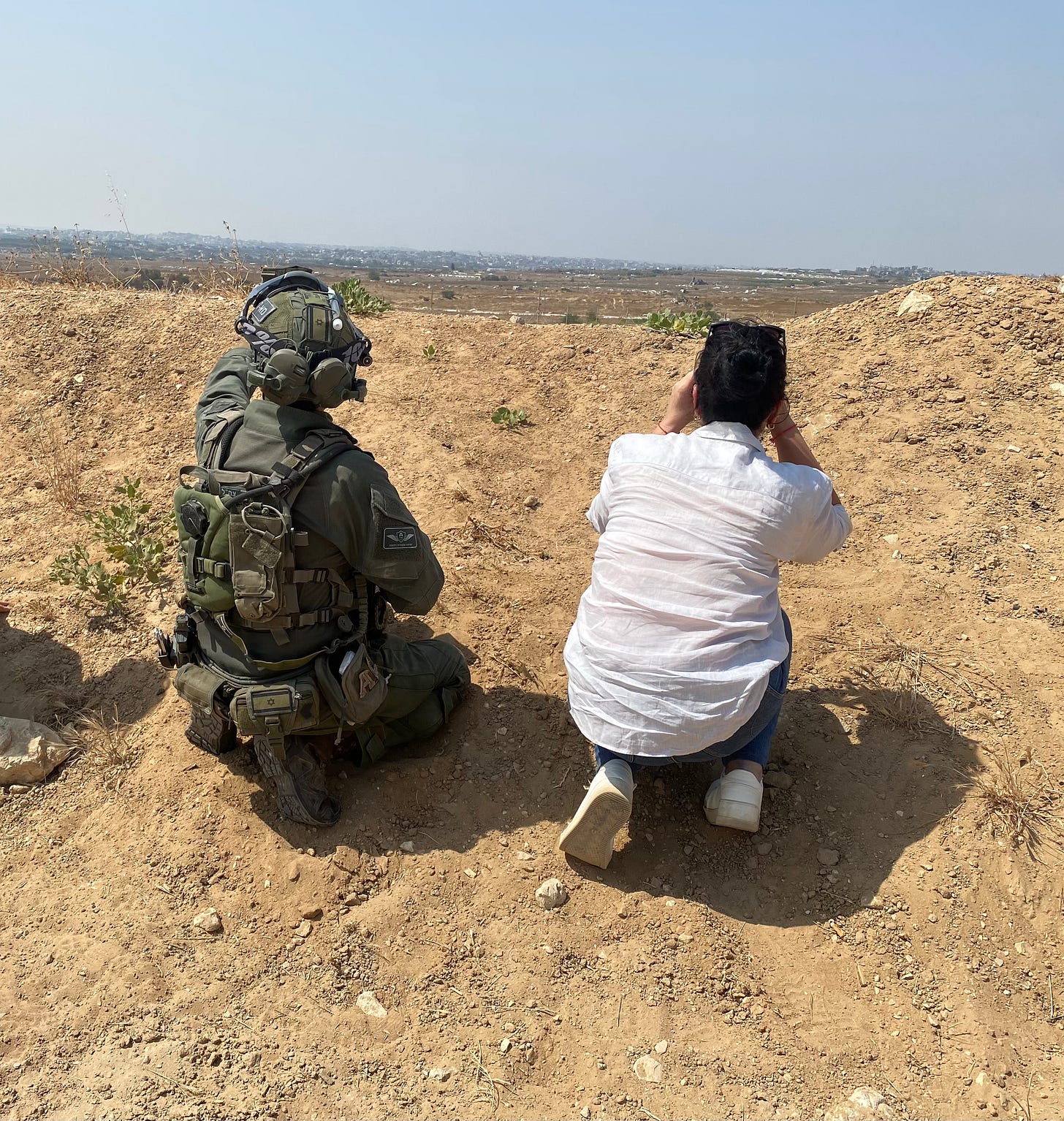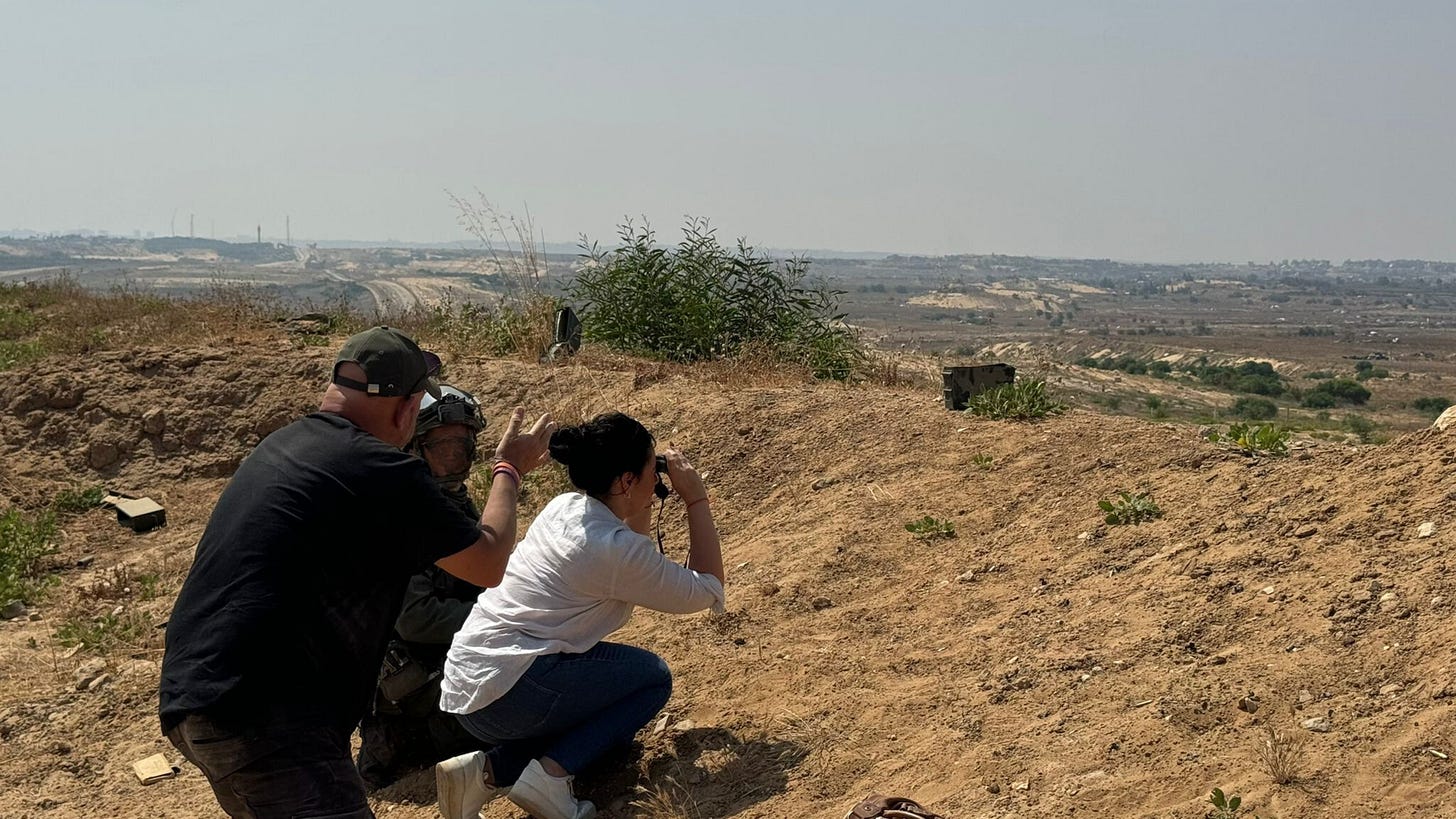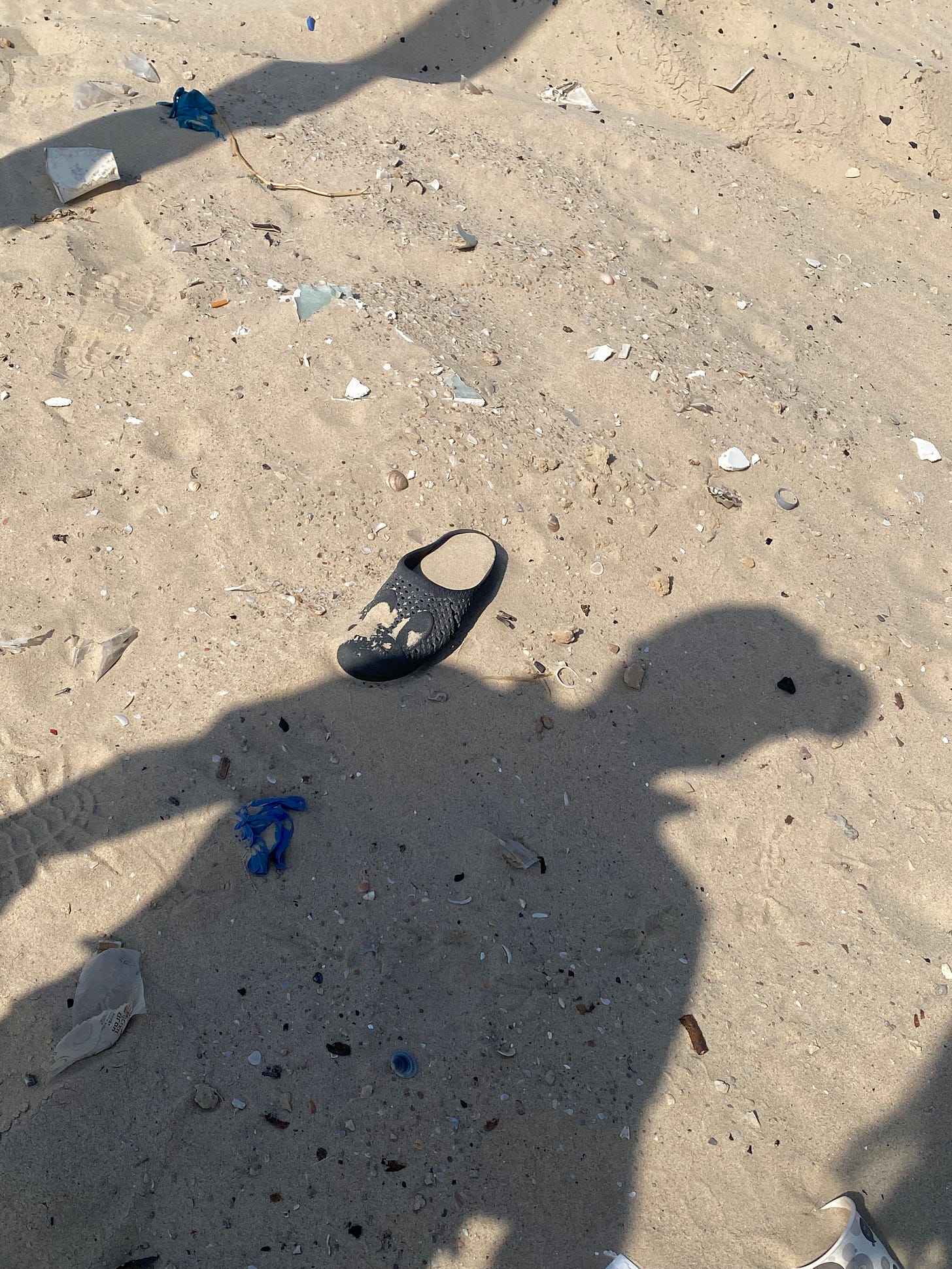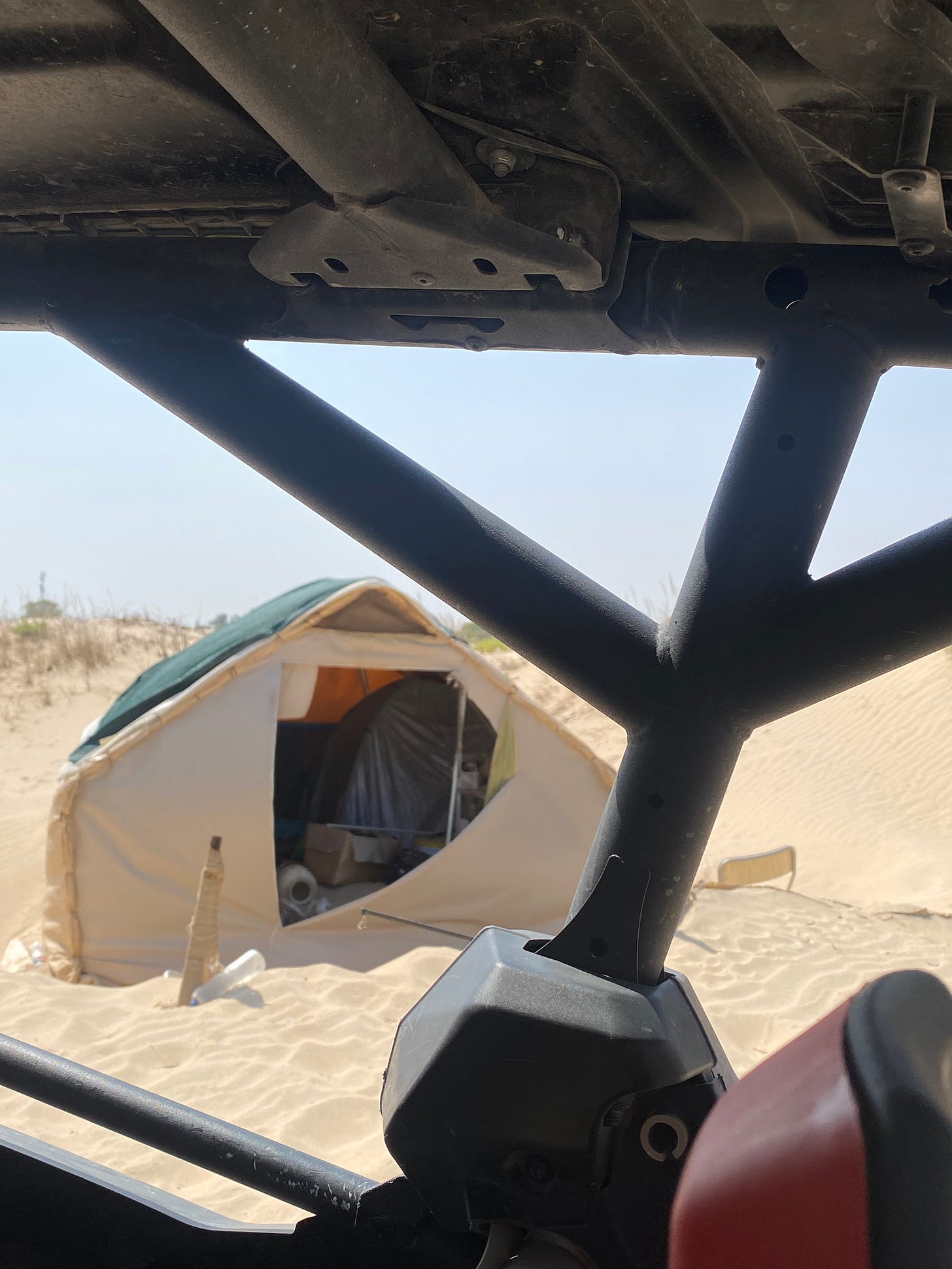'This is Gaza.'
"Get down low, on your stomach... If we’re seen, we’re in danger of sniper fire.”
Prefer to listen instead? Rebecca Davis reads This is Gaza.
“Get down low, on your stomach,” says Uri*.
He is a reservist in the Israel Defence Force’s (IDF) Tactical Vehicle special unit.
“They watch us. And if we’re seen, we’re in danger of sniper fire.”
We crawl through rocky sand littered by bullet casings, and ascend the back slope of a mound from which we peer over.
“This is Gaza,” he points to the fence, just a few meters away.
And there it is: the contentious ground and subject of global media and debate – on streets, at universities and in parliaments around the world.
This is where our hostages are being held; inside this relatively small coastal strip. Somewhere.
The boom of artillery fire reverberates in the distance. The might of the sound evokes a visceral unease that hits deep within.
Now squatting, Uri balances his assault rifle, looking through the sight.
“Come, look,” he beckons. I lean in, my eye trying to find its focus.
Beyond the prickly pears and rocky outcrops, I see ramshackle clusters of Palestinian buildings.
An all-seeing Israeli drone balloon is suspended above, punctuating the horizon.
“Jabalya. Beit Lahia. Beit Hanoun,” Uri gestures his outstretched arm in different directions, before handing me his binoculars.
Uri looks to be in his early 40s; although, it’s hard to tell. He has been serving in Gaza ever since the war began – and it’s been a long eight months. His skin is dull; his dark beard, shabby and flecked with grey; and the lines between his brows are deeply carved.
He says he’s only been able to make it home to see his children twice each month.
“But this is the life in Israel. We are doing this for our country. We’re not supposed to complain. This is our home. My kids will grow up here.”
For 21 years, Uri served in a special counter-terrorism unit – “Here, I am saving lives every day”.
Uri and his team use specially fitted out all-terrain vehicles (ATVs) to medevac; extracting injured soldiers and rushing them out of Gaza and into Israel for urgent medical attention.
“Inside Gaza is very difficult. There aren’t proper roads. The tank cannot go fast to save the soldiers, and no car can do what these vehicles do.”
The ATV’s are capable of hurtling over sand dunes of speeds up to 120 kilometres per hour.
“We can get someone from the middle of Gaza and back into Israel in less than four minutes.”
It can mean the difference between life and death.
Gesturing toward Beit Hanoun, Uri shares about a recent incident where four Israeli soldiers were struck by Hamas fire.
“We went inside, still under fire, and we got them all out, and over the border where a helicopter was waiting.”
Tragically, two of the soldiers died.
“But the doctor in the helicopter said that if they were waiting five minutes more, the surviving soldiers would be dead also.”
Five hours later, another event occurred.
This time, six Israeli soldiers were shot by a Hamas sniper.
Sadly, two soldiers lost their lives. But Uri’s team were able to save the other four.
“This was really amazing. Thank God we have these vehicles. It’s really changed lives.”
The Aussie connection
I first met Uri earlier that morning when he and a few of his fellow soldiers came blasting across the sand dunes of Zikim in a convoy of three ATVs.
They’d left Gaza to meet with Australian olah, Ari Briggs – the man responsible for fundraising and procuring the ATVs.
Today, Ari brings more lifesaving equipment: two sets of night vision goggles – valued at US$10,000 each.

Since the war began, Ari made it his own personal mission to do everything within his power to support the soldiers.
Three of his five sons have served in the IDF since the inception of the war.
After driving one son back to base as a reservist on October 7, Ari soon began receiving messages from him, telling of the lack of protective gear available for his reconnaissance unit, and the unit of one of his friends.
With war unanticipated, there was a severe shortage: The soldiers had been given combat vests – without ceramic plates. No helmets.
Desperately anguished, Ari made a deal with God:
I’ll try to save as many lives as possible. I’ll get lifesaving equipment for our soldiers – but please look after my kids.
And then he got to work.
Within hours, Ari had contacted suppliers, and sourced enough ceramic plates for both units. He immediately drove back to the bases in the south to make the special delivery.
Only moments before Ari arrived at one of the bases, two Hamas terrorists had been shot after attempting to infiltrate on their motorcycles.
But no threat has lessened Ari’s determination. Embodying a solid dose of Israel’s ‘start-up’ mentality, Ari scaled his personal goal; evolving it into a grassroots organisation, One People – Together for Israel.
With a background in entrepreneurship, Ari put his skills and contacts to use. He developed partnerships, directly dealt with supply factories and customs, and got fundraising.
In just the first few months, he was able to raise a staggering US$4 million.
Mobilising volunteer parents, businesspeople and community leaders, One People supplies lifesaving equipment to those who need it most. It started with the IDF, but then grew to assist first response teams and civilian organisations. One hundred per cent of donations go towards the equipment, with not a cent spent on salaries or administration.
“We all have to do what we can,” says Ari, who made aliyah with his wife Shuli from Sydney over 30 years ago.
“In these unprecedented times, our unity as Jews is the answer. After all, we are one people!”
A bumpy ride
Ari hands over the night vision goggles to Tomer*. Originally from the US, he is a lone soldier reservist in the Tactical Vehicle special unit.
A broad, white smile spreads across his young face as he thanks Ari with deep gratitude.
Moments later, I’m strapped into the passenger seat of the ATV as Tomer drives towards the border fence.
“You don’t know what this equipment means for us,” he shouts over the engine.
“Inside Gaza at night, it’s pitch black. You can’t see a few meters ahead of you. You’re going in blind.
“This is going to help us really understand what we’re doing in the night to save lives.”
The sand of Zikim Beach lashes our faces, as the remnants of October 7 remain.
A lone shoe. Mangled pieces of steel. Shipping containers punctured with bulletholes.
19 civilians were killed on Zikim Beach by Hamas terrorists when they launched their attack that morning.
Fishermen. Teenagers on a camping trip. A group that partied on the beach the night before.
Tomer makes a turn further along the sand. Behind some shrubs and with a perfect view of the Mediterranean sea; there lies a single, abandoned tent.
Signs of normal life eerily remain inside: a toothbrush stands in a container. A tube of pringles. A plastic chair.
The couple that stayed within the tent were forced to run for their lives. They were shot, but miraculously survived.
The ATV bounces and thuds as we scale the sand dunes and return to the road. We pass the Zikim army base, and a group of commanders meeting roadside under a makeshift marquee. Tanks fluttering Israeli flags are lined up on barren ground.
Two giant steel gates are an abrupt end to the road ahead – the border entrance.
“It’s about to get very bumpy!,” Tomer jokes, going off-road and into the sharp peaks and troughs of the sand along the fence line.
He wasn’t joking.
“By the way, this is how it is inside Gaza!”
‘If it wasn’t for our brothers and sisters…’
In the first month of the war, Uri fought in Gaza with nothing but a gun.
“There were no opticals. I know how to fight without, but it’s much easier and safer if we have the right equipment.”
He also didn’t have ceramic plates in his vest. So, after a month, he went and spent 10,000 shekels of his own money to purchase for everyone in his unit.
“Anyone that helps us, we need it. All of us, we’ve left our families as miluim (reservists), and we’re doing our best – but when we have support like this, it’s much easier, much better.”
“And if it wasn’t for our Jewish brothers and sisters all over the world, supporting us with equipment and vehicles, we simply wouldn’t have it in the fight.
“Without you, we cannot do it – that’s the bottom line.”
I tell him: “Thank you – for all you are doing. Really.”
“No. Thank you,” Uri insists, before turning to Tomer and the other soldiers.
“Y’allah boee, we need to go!” he calls.
“Time to go back in for our next mission.”
* Not their real name.
For more information on One People – Together for Israel, or to donate,
visit onepeopleisrael.org












